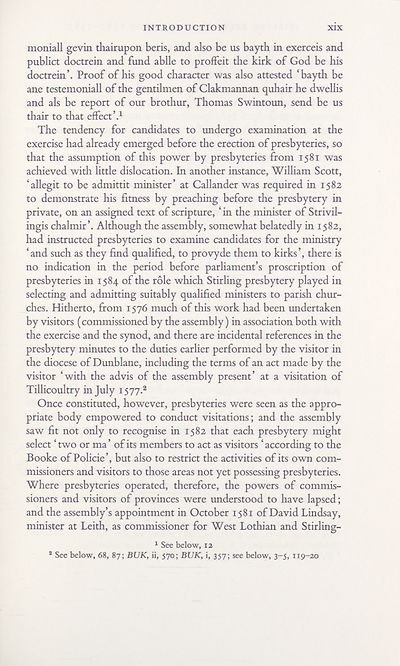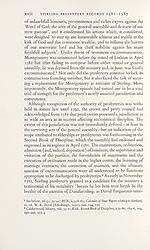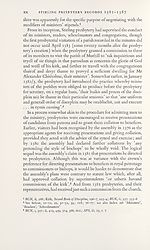Series 4 > Stirling Presbytery Records 1581-1587
(24) Page xix
Download files
Complete book:
Individual page:
Thumbnail gallery: Grid view | List view

INTRODUCTION
xix
moniall gevin thairupon beris, and also be us bayth in exerceis and
publict doctrein and fund ablle to proffeit the kirk of God be his
doctrein’. Proof of his good character was also attested ‘bayth be
ane testemoniall of the gentilmen of Clakmannan quhair he dwellis
and als be report of our brothur, Thomas Swintoun, send be us
thair to that effect’.1
The tendency for candidates to undergo examination at the
exercise had already emerged before the erection of presbyteries, so
that the assumption of this power by presbyteries from 1581 was
achieved with little dislocation. In another instance, William Scott,
‘allegit to be admittit minister’ at Callander was required in 1582
to demonstrate his fitness by preaching before the presbytery in
private, on an assigned text of scripture, ‘in the minister of Strivil-
ingis chalmir’. Although the assembly, somewhat belatedly in 1582,
had instructed presbyteries to examine candidates for the ministry
‘and such as they find qualified, to provyde them to kirks’, there is
no indication in the period before parliament’s proscription of
presbyteries in 1584 of the role which Stirling presbytery played in
selecting and admitting suitably qualified ministers to parish chur¬
ches. Hitherto, from 1576 much of this work had been undertaken
by visitors (commissioned by the assembly) in association both with
the exercise and the synod, and there are incidental references in the
presbytery minutes to the duties earlier performed by the visitor in
the diocese of Dunblane, including the terms of an act made by the
visitor ‘with the advis of the assembly present’ at a visitation of
Tillicoultry in July 1577.2
Once constituted, however, presbyteries were seen as the appro¬
priate body empowered to conduct visitations; and the assembly
saw fit not only to recognise in 1582 that each presbytery might
select ‘two or ma’ of its members to act as visitors ‘according to the
Booke of Policie’, but also to restrict the activities of its own com¬
missioners and visitors to those areas not yet possessing presbyteries.
Where presbyteries operated, therefore, the powers of commis¬
sioners and visitors of provinces were understood to have lapsed;
and the assembly’s appointment in October 1581 of David Lindsay,
minister at Leith, as commissioner for West Lothian and Stirling-
1 See below, 12
1 See below, 68, 87; BUK, ii, 570; BUK, i, 357; see below, 3-5, 119-20
xix
moniall gevin thairupon beris, and also be us bayth in exerceis and
publict doctrein and fund ablle to proffeit the kirk of God be his
doctrein’. Proof of his good character was also attested ‘bayth be
ane testemoniall of the gentilmen of Clakmannan quhair he dwellis
and als be report of our brothur, Thomas Swintoun, send be us
thair to that effect’.1
The tendency for candidates to undergo examination at the
exercise had already emerged before the erection of presbyteries, so
that the assumption of this power by presbyteries from 1581 was
achieved with little dislocation. In another instance, William Scott,
‘allegit to be admittit minister’ at Callander was required in 1582
to demonstrate his fitness by preaching before the presbytery in
private, on an assigned text of scripture, ‘in the minister of Strivil-
ingis chalmir’. Although the assembly, somewhat belatedly in 1582,
had instructed presbyteries to examine candidates for the ministry
‘and such as they find qualified, to provyde them to kirks’, there is
no indication in the period before parliament’s proscription of
presbyteries in 1584 of the role which Stirling presbytery played in
selecting and admitting suitably qualified ministers to parish chur¬
ches. Hitherto, from 1576 much of this work had been undertaken
by visitors (commissioned by the assembly) in association both with
the exercise and the synod, and there are incidental references in the
presbytery minutes to the duties earlier performed by the visitor in
the diocese of Dunblane, including the terms of an act made by the
visitor ‘with the advis of the assembly present’ at a visitation of
Tillicoultry in July 1577.2
Once constituted, however, presbyteries were seen as the appro¬
priate body empowered to conduct visitations; and the assembly
saw fit not only to recognise in 1582 that each presbytery might
select ‘two or ma’ of its members to act as visitors ‘according to the
Booke of Policie’, but also to restrict the activities of its own com¬
missioners and visitors to those areas not yet possessing presbyteries.
Where presbyteries operated, therefore, the powers of commis¬
sioners and visitors of provinces were understood to have lapsed;
and the assembly’s appointment in October 1581 of David Lindsay,
minister at Leith, as commissioner for West Lothian and Stirling-
1 See below, 12
1 See below, 68, 87; BUK, ii, 570; BUK, i, 357; see below, 3-5, 119-20
Set display mode to:
![]() Universal Viewer |
Universal Viewer | ![]() Mirador |
Large image | Transcription
Mirador |
Large image | Transcription
Images and transcriptions on this page, including medium image downloads, may be used under the Creative Commons Attribution 4.0 International Licence unless otherwise stated. ![]()
| Scottish History Society volumes > Series 4 > Stirling Presbytery Records 1581-1587 > (24) Page xix |
|---|
| Permanent URL | https://digital.nls.uk/126646443 |
|---|
| Description | Over 180 volumes, published by the Scottish History Society, containing original sources on Scotland's history and people. With a wide range of subjects, the books collectively cover all periods from the 12th to 20th centuries, and reflect changing trends in Scottish history. Sources are accompanied by scholarly interpretation, references and bibliographies. Volumes are usually published annually, and more digitised volumes will be added as they become available. |
|---|


